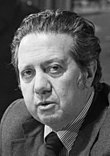| |||||||||||||||||||||||||||||||||||||||||||||||||||||||||
250 seats to the Portuguese Assembly 125 seats needed for a majority | |||||||||||||||||||||||||||||||||||||||||||||||||||||||||
|---|---|---|---|---|---|---|---|---|---|---|---|---|---|---|---|---|---|---|---|---|---|---|---|---|---|---|---|---|---|---|---|---|---|---|---|---|---|---|---|---|---|---|---|---|---|---|---|---|---|---|---|---|---|---|---|---|---|
| Registered | 7,249,346 | ||||||||||||||||||||||||||||||||||||||||||||||||||||||||
| Turnout | 6,007,453 (82.9%) | ||||||||||||||||||||||||||||||||||||||||||||||||||||||||
| |||||||||||||||||||||||||||||||||||||||||||||||||||||||||
| |||||||||||||||||||||||||||||||||||||||||||||||||||||||||
The 1979 Portuguese legislative election took place on 2 December. The election renewed all 250 members of the Assembly of the Republic, 13 seats less than those elected in 1976.
The 3 years prior to the election were very unstable with Prime Minister Mário Soares' government collapsing in August 1978 and being succeeded by three Presidential appointed governments, in which the first two also collapsed due to lack of Parliamentary support. In the summer of 1979, President of Portugal António Ramalho Eanes dissolved Parliament and called an election for 2 December 1979 and, until the elections, the President nominated Maria de Lourdes Pintasilgo, the first and still only woman to lead a government in Portugal, as Prime Minister.
In the elections, the right-wing parties, the Social Democratic Party, the Democratic and Social Center and the People's Monarchist Party united in the Democratic Alliance (Portuguese: Aliança Democrática or AD) under the leadership of Sá Carneiro won the election, receiving 45 percent of the votes and an absolute majority in seats. The Socialists lost more than 30 MPs and the Communists, now allied with the Portuguese Democratic Movement in the United People Alliance achieved their highest total ever, with almost 20 v of the voting.
Turnout dropped slightly to 82.6 percent, but the number of ballots cast surpassed 6 million.
Cite error: There are <ref group=lower-alpha> tags or {{efn}} templates on this page, but the references will not show without a {{reflist|group=lower-alpha}} template or {{notelist}} template (see the help page).




